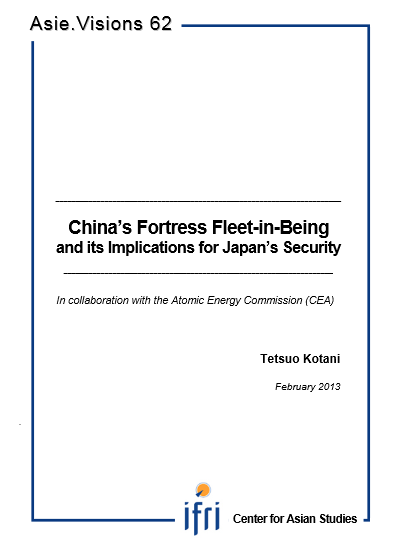China's Fortress Fleet-in-Being and its Implications for Japan's Security

This paper analyzes the rise of maritime China and its implications for Japan’s security policy.
In recent years, Chinese naval capabilities have been growing. Beijing aims to expand its maritime presence in the region, but also to limit the access of other fleets - primarily the US Navy - to its nearby waters. This Chinese anti-access/area-denial approach is analyzed here through the concepts of fortress fleet and fleet-in-being. Tokyo has reinforced its deterrence capability toward Chinese naval activities by setting up a more “dynamic defense” and concentrating efforts to protect its southwestern border. In addition to Japan’s efforts, the reinforcement of the alliance with the United States in the context of the American rebalancing toward Asia is also a major element in providing an effective response to Chinese maritime expansion. Despite his hawkish rhetoric, Japanese Prime Minister Shinzo Abe would not change Japan’s security policy dramatically but rather seek communication with Beijing in order to ensure crisis management.

Available in:
Regions and themes
ISBN / ISSN
Share
Download the full analysis
This page contains only a summary of our work. If you would like to have access to all the information from our research on the subject, you can download the full version in PDF format.
China's Fortress Fleet-in-Being and its Implications for Japan's Security
Related centers and programs
Discover our other research centers and programsFind out more
Discover all our analysesEuropean Union-India: Lasting Rapprochement or Partnership of Convenience?
The partnership between the European Union (EU) and India has long been limited to economic exchanges. Its political dimension has gradually developed, culminating in its elevation to the status of a “strategic partnership” in 2004. However, the failure of negotiations for a free-trade agreement in 2013 slowed this momentum. Since the early 2020s, in an uncertain geopolitical context, bilateral rapprochement has gained new momentum.
Japan’s Takaichi Landslide: A New Face of Power
Prime Minister Sanae Takaichi has turned her exceptional popularity into a historic political victory. The snap elections of February 8 delivered an overwhelming majority for the Liberal Democratic Party (LDP), driven by strong support from young voters, drawn to her iconoclastic and dynamic image, and from conservative voters reassured by her vision of national assertiveness. This popularity lays the foundation for an ambitious strategy on both the domestic and international fronts.
The U.S. Policy Toward Taiwan Beyond Donald Trump: Mapping the American Stakeholders of U.S.-Taiwan Relations
Donald Trump’s return to the White House reintroduced acute uncertainty into the security commitment of the United States (U.S.) to Taiwan. Unlike President Joe Biden, who repeatedly stated the determination to defend Taiwan, President Trump refrains from commenting on the hypothetical U.S. response in the context of a cross-Strait crisis.

China’s Strategy Toward Pacific Island countries: Countering Taiwan and Western Influence
Over the past decade, China has deployed a diplomatic strategy toward the Pacific Island Countries (PICs). This strategy pursues two main objectives: countering Taiwan's diplomatic influence in the region and countering the influence of liberal democracies in what Beijing refers to as the "Global South."









